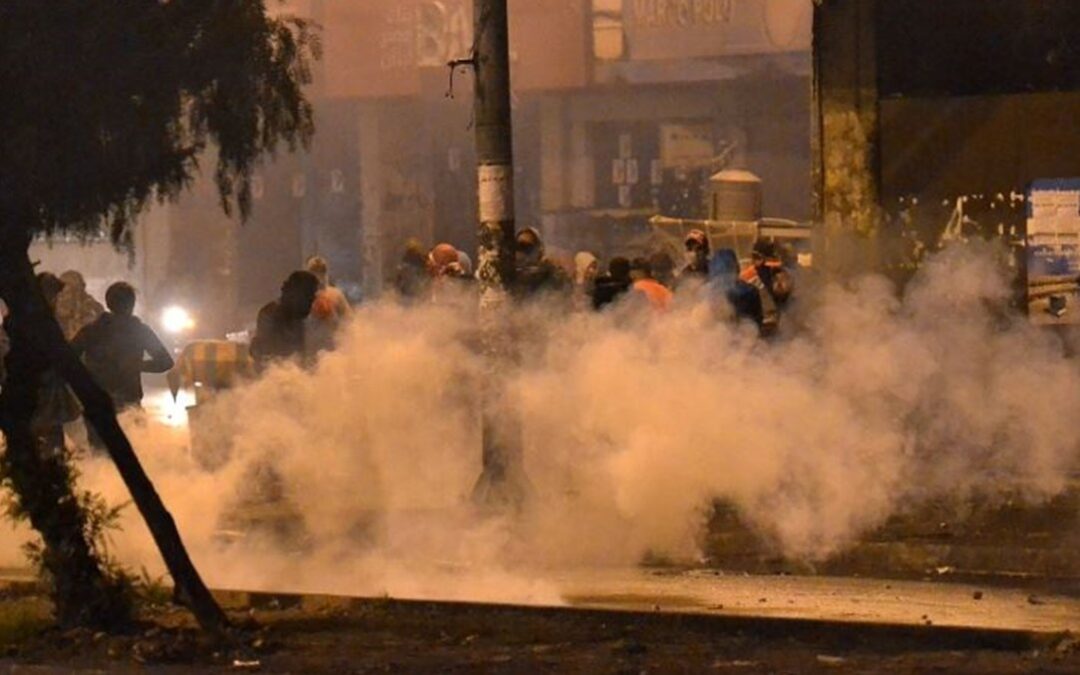
Feb 10, 2021 | News
The ICJ and the Lebanese Center for Human Rights (CLDH) are deeply concerned about the role of the military in the arrest, detention and referral for prosecution by military courts of dozens of civilians in Tripoli.
The military’s crackdown has taken place in the context of ongoing protests in the city against a dire economic situation exacerbated by the nation-wide lockdown imposed by the government with the stated intention of combatting the COVID-19 pandemic.
“Under the Rule of Law, the military has no business policing demonstrations, detaining protesters or prosecuting civilians,” said Said Benarbia, the ICJ’s Middle East and North Africa Programme Director. “Instead of addressing the legitimate grievances of those protesting, the Lebanese government is using the military to silence dissenting voices by arresting and sending protestors for trial before military tribunals.”
While the military reported the arrest of five individuals on 27 January, five on 29 January and another 17 on 31 January, for, among other things, allegedly engaging in “rioting,” “vandalism” and “obstruction of civil defence,” other sources suggest at least 58 civilians were arrested by the military in connection with the above-mentioned protests in Tripoli. The whereabouts of many detainees remained undisclosed for days following their arrest. According to lawyers, the military’s Office of Public Prosecution has referred at least 14 individuals to a military Investigating Judge.
The ICJ and CLDH call on the Lebanese authorities to ensure that the military plays no role in policing the ongoing protests and in other law enforcement functions that are properly the sole responsibility of civilian law enforcement agencies. The military courts’ jurisdiction, in particular, must be confined exclusively to the commission of military offences by military personnel and, in turn, totally exclude the possibility of prosecuting civilians, as well as cases involving the perpetration of human rights violations by military personnel.
Referrals by the military’s Office of Public Prosecution follow an increasing, worrying trend of trying those involved in anti-government protests before military courts, which are neither independent nor impartial, and whose procedures do not comply with international fair trial standards.
“Lebanon’s military tribunals have a grim history of unfair trials and politicized proceedings against those suspected of opposing the government,” said Fadel Fakih, CLDH’s Executive Director. “If faith in the Lebanese justice system is to be restored, the jurisdiction of military tribunals must be fully reformed,” he added.
In a 2018 briefing paper entitled “The Jurisdiction and Independence of the Military Courts System in Lebanon in Light of International Standards,” the ICJ called on the Lebanese authorities to enhance the independence and impartiality of military courts, ensure the fairness of their procedures, and restrict their jurisdiction to cases involving members of the military for military offences.
Contact
Said Benarbia, Director of the ICJ Middle East and North Africa Programme, t: +41 22 979 38 17; e: said.benarbia(a)icj.org.
Fadel Fakih, Director of the Lebanese Center for Human Rights, t +961 81 065 041; e: ffakih(a)cldh-lebanon.org
Download
Lebanon-Military-Courts-COVID19-Press-Release-2021-ENG.pdf (English)
Lebanon-Military-Courts-COVID19-Press-Release-2021-ARB.pdf (Arabic)
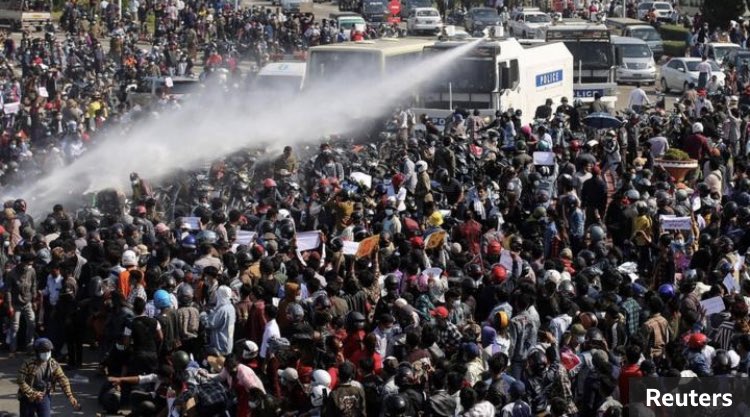
Feb 8, 2021 | News
The Myanmar military’s coup d’etat of 1 February is unconstitutional and fails to comply with basic rule of law principles, said the ICJ today.
“The Myanmar military’s actions violate even the flawed Constitution that the military itself imposed in 2008,” said Sam Zarifi, ICJ’s Secretary General. “The irregularities alleged by the military in the recent elections do not justify declaring a state of emergency and shattering the already weak rule of law in the country.”
The coup d’etat does not comply with the Constitution of the Republic of the Union of Myanmar 2008, which suffers from multiple shortcomings in basic respect for the rule of law and international human rights standards.
Article 417 of the Constitution requires the President to declare a state of emergency when there is a risk to the sovereignty of the country.
Article 418 requires the President to hand over all power to the Commander-in-Chief of the Army. Contrary to this provision, the state of emergency was declared by the Vice-President, after the military detained President Win Myint.
“The accountability of the military to the civilian authorities is a core rule of law principle”, said Sam Zarifi “Myanmar’s military leaders have turned this principle on its head by usurping total authority again.”
The ICJ is concerned that Myanmar’s Constitution provides for the possibility of suspending protections for a number of human rights, such as freedom of expression and association and the right to habeas corpus. Under international human rights law, derogations from certain rights are permissible only when strictly necessary to meet a specific threat to the life of the nation, conditions not met under the current emergency.
The right to habeas corpus is among those rights that may never be suspended. The writ of habeas corpus allows any person detained by any State agent, including during emergencies, to challenge the lawfulness of the detention.
“The right to test the lawfulness of any detention needs to be restored and the judiciary must be able to independently examine the legality of any arrests and detentions and order to release of those it finds are detained illegally” said Sam Zarifi.
Of particular concern to the ICJ is the near-total impunity provided to the military after the declaration of the State of Emergency, and the proliferation of arbitrary detention without recourse to legal review.
Article 432 of the Constitution effectively shields the military and security forces from any review of ’legitimate measures’ pursuant to the declaration of a state of emergency, which the ICJ notes also flies in the face of the rule of law.
“After the shock of the coup d’etat, we are now seeing brave lawyers and civil society activists trying to use peaceful means at their disposal to demand their rights,” Zarifi said. “This movement is not focused around an icon or even one party, but on the notion that the people of Myanmar should be able to government themselves and decide their future.”
Contact
Sam Zarifi, ICJ’s Secretary General, sam.zarifi(a)icj.org
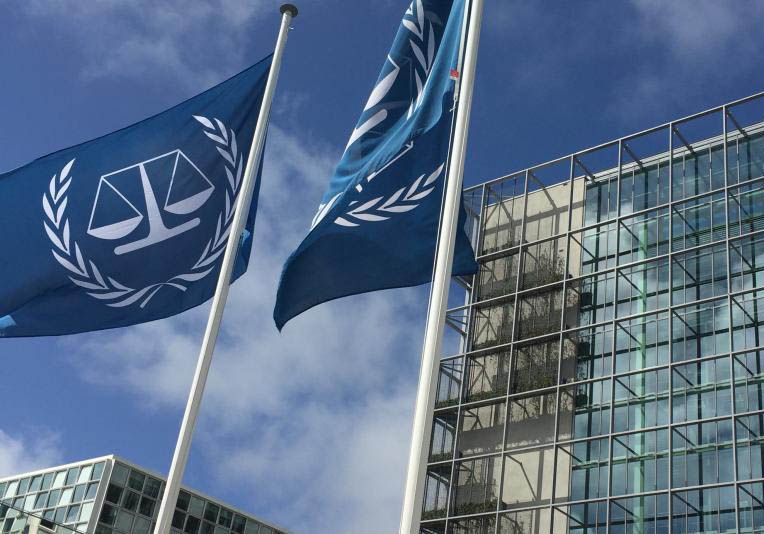
Feb 8, 2021 | News
The ICJ welcomes the International Criminal Court’s (ICC) decision establishing that the Court can assert its jurisdiction over serious crimes alleged to have occurred in the State of Palestine since 13 June 2014.
On 5 February 2021, the ICC Pre-Trial Chamber I held by majority that: (i) Palestine has correctly acceded to the Rome Statute and has thus become a State party to it; and (ii) the ICC’s territorial jurisdiction extends to “the territories occupied by Israel since 1967, namely Gaza and the West Bank, including East Jerusalem.”
“The ruling is a first step towards breaking the cycle of impunity for crimes under international law committed by all parties to the conflict in Palestine,” said Said Benarbia, the ICJ’s MENA Programme Director. “The Prosecutor should immediately open an investigation with a view to establishing the facts about such crimes, and identifying and prosecuting those most responsible.”
The decision was prompted by a request of the ICC Office of the Prosecutor seeking confirmation of the Court’s territorial jurisdiction.
The Prosecutor had previously concluded that there is a reasonable basis to believe that “war crimes have been or are being committed in the West Bank, including East Jerusalem, and the Gaza Strip.”
On 16 March 2020, the ICJ submitted amicus curiae observations in support of the Court’s jurisdiction, arguing that:
- Palestine has successfully acceded, and is a State Party, to the Rome Statute. The Court should accordingly exercise its jurisdiction over Palestine as it does in respect of any other State Party;
- The Palestinian Territory over which the Court should exercise jurisdiction comprises the West Bank, including East Jerusalem, and Gaza; and
- Palestine is a State under international law, satisfying recognized international law criteria for statehood, displaying State activity and engaging in diplomatic relations with other sovereign States. The decades-long belligerent occupation of Palestine by itself has no decisive legal effect on the validity of its claim to sovereignty and statehood.
The Pre-Trial Chamber decision confirmed the first two of these observations, without considering the status of Palestine’s statehood under general international law.
Contact
Said Benarbia, Director, ICJ Middle East and North Africa Programme; t: +41 22 979 3817 e: said.benarbia(a)icj.org
Vito Todeschini, Legal Adviser, ICJ Middle East and North Africa Programme; t: +216 53 334 679 e: vito.todeschini(a)icj.org
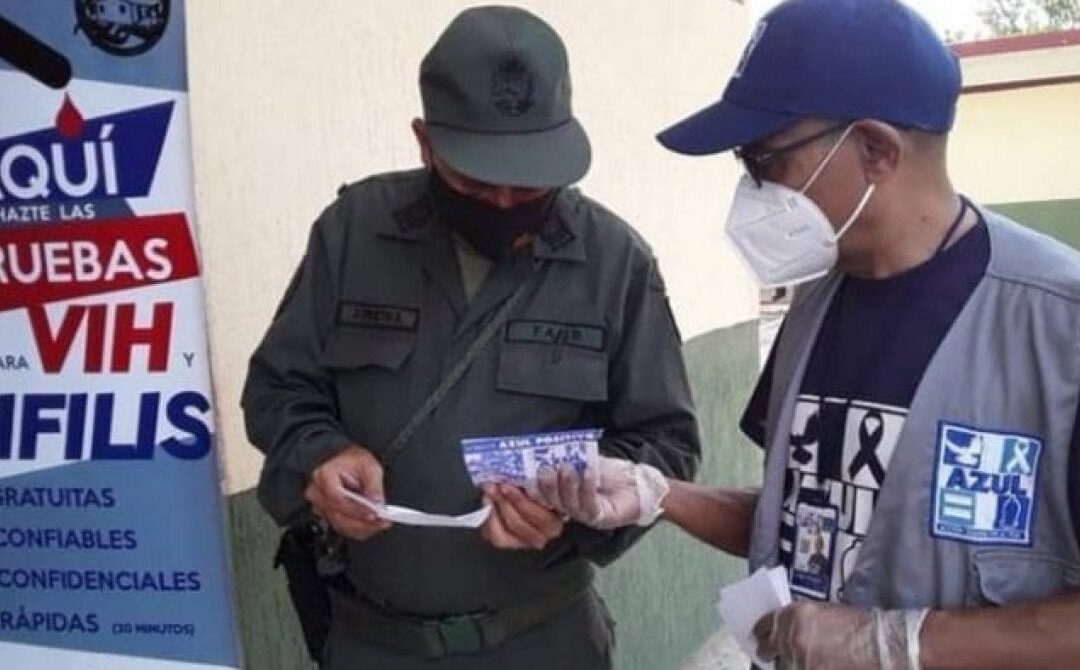
Feb 6, 2021 | News
The recent, ongoing and unwarranted detention of five members of the Venezuelan NGO ‘Azul Positivo’ is one more event in a series of threats, harassment, attacks, restrictions, reprisals and criminal proceedings against Venezuelan civil society organizations and human rights defenders, which has been intensifying since November 2020.
In recent months and weeks, state agents have forcibly entered the offices of civil society organizations; public threats have been made against defenders who have been engaging with human rights mechanisms, NGO bank accounts have been frozen and arrest warrants issued for aid workers.
Venezuelan civil society operate in a context of serious legal and administrative obstacles with domestic laws used to target human rights defenders, such as the ‘Law Against Hate’, or having the effect of limiting the operations of NGOs and restricting their access to funding, essentially blocking the work of many organizations vital for Venezuelans in need.
In a public statement, a number of UN independent human rights experts and regional experts have described threats and measures taken against Venezuelan civil society since November 2020 as amounting to ‘systematic persecution and stigmatization.’
It is essential that humanitarian and human rights organizations responding to the grave humanitarian and human rights crises in the country, pushing for accountability for violations and abuses and the return of guarantees provided by democratic institutions and processes are able to do their work without fear or hindrance.
Human rights defenders are critical, constructive and essential to democracies and the functioning of the rule of law. Attempts to silence and cow them are counterproductive and shameful.
We urge the Venezuelan authorities to ensure that harassment and threats against Venezuelan defenders stop and for all international legal guarantees to be respected. We call on all states and UN bodies and agencies to actively support civil society organizations, defenders and activists and to speak up loudly and consistently for the right to defend human rights in Venezuela and globally.
We are inspired by the daily commitment and courage of Venezuelan human rights defenders and humanitarian workers and stand in solidary with our Venezuelan partners and friends.
Amnesty International
Center for Justice and International Law (CEJIL)
CIVICUS
Civil Rights Defenders
Conectas Diretos Humanos
Freedom House
Global Centre for the Responsibility to Protect
Human Rights Watch
International Commission of Jurists
International Service for Human Rights
People in Need
Washington Office on Latin America (WOLA)
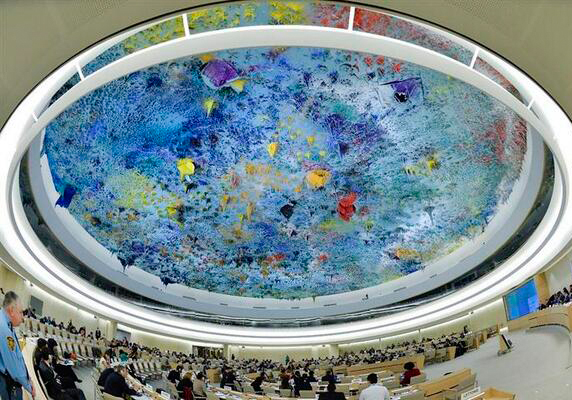
Feb 5, 2021 | Advocacy, Non-legal submissions
Today, the ICJ and other human rights NGOs have written to UN Member States to call for a renewal of the mandate of the UN Commission on Human Rights in South Sudan.
The joint letter highlights the existing remaining concern on the human rights situaion in South Sudan and provide with key recommendation for its functioning.
Find the joint letter here: SouthSudan-UN-JointLetter-Advocacy-NonLegal-2021-ENG
Contact:
Massimo Frigo, ICJ UN Representative, e: massimo.frigo(a)icj.org, t: +41797499949









